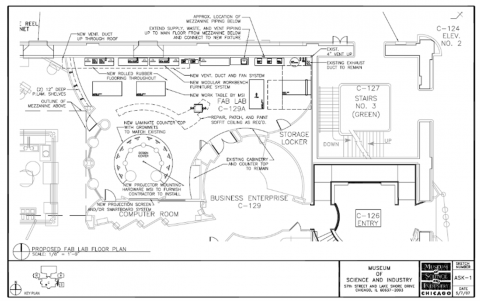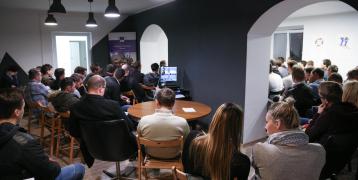Fab Labs: a flexible policy tool for place-based challenges
The concept of a Fab Lab emerged at the Massachusetts Institute of Technology MIT’s Centre for Bits and Atoms (CBA), a cross-campus programme that aims to merge the digital world with the physical world, during a course on How to Make Almost Anything in 2001. A Fab Lab or Fabrication Laboratory “is a collection of commercially available machines and parts linked by software and processes we developed for making things” (MIT).
The concept of a Fab Lab has quickly spread all over the world. Established by Distributed Design with funding from the European Commission Creative Europe programme, the Fab Lab Network has members in more than 120 countries and with more than 2,000 Fab Labs across the globe (see map).
Fab Labs provide access to the environment, the skills, the materials and the advanced technology to allow anyone anywhere to make (almost) anything (fabfoundation). They are physical spaces offering access to digital and industrial-grade fabrication and electronics tools, open-source software, and programmes to support prototyping.
They are a place to play, create, learn, mentor, and invent: a place for learning and innovation. They offer tools such as Numerically Controlled (NC) knife cutting, laser cutters to make 2D and 3D structures; microcontroller equipment; NC machining to make circuit boards, precision parts, and mold casting; 3D Printers; wood routers; access to sensors, actuators, and displays; and wired and wireless communications (see the list of machines and materials here).
Fab Labs, however, must have the four following requirements to qualify for membership to the Fab Lab Network. These are:
- Public access to the Fab Lab for free or in-kind service/barter at least part of the time each week.
- Fab Labs must support and subscribe to the Fab Charter.
- Fab Labs have to share a common set of tools and processes.
- Fab Labs must participate in the Fab Lab Network.
The Fab Foundation provides guidelines and recommendations to set up Fab Labs from leadership to funding and the physical space (see the Chicago Layout on the right).
Fablab beneficiaries
The concept of a Fab Lab has been used across the world to empower different beneficiaries—from students to entrepreneurs—and to address local challenges—from promoting an entrepreneurial mindset to responding to local societal challenges.
For instance, in Arctic Norway, sheep and reindeer herders are using Fab Labs to develop radio collars and wireless networks to track their animals’ movements.
In Pabal, a village in India, a dairy farmer’s income depends on the fat content of the cow’s milk. Local students are now using a Fab Lab to build a sensor to give the farmers an exact measure of the fat content. And in Takoradi, Ghana, engineers are working on a solar-energy project to bring power to the villages (MIT).
Fablabs as a policy tool
European policymakers have used the concept of a Fab Lab as a place-based policy tool to respond to regional and local challenges.
From AGRI RENAISSANCE which supports innovation in the food sector to URBAN M which fosters urban manufacturing, many Interreg Europe projects have designed and delivered policies to support the concept of Fab Labs to respond to place-based challenges.
Fab Labs can focus on regional sectoral priorities. In AGRI RENAISSANCE, the Food FABLAB is a shared innovation infrastructure that allows private companies to test, conduct internal R&D activities, licence, and manufacture food products. The service is provided by TAGUSVALLEY, a science and technology park located in Centro region, Portugal. More than 25 companies have used the Food FABLAB. The good practice also reveals regional resilience and how a region has adapted its services to respond to an economic crisis.
University-industry collaboration
Fab Labs can promote university-industry collaboration.
In INNOBRIDGE, the partner from Castilla y Léon in Spain introduced a policy change to promote university-industry collaboration within public universities through the creation of Fab Labs. Four Fab Labs were created in four regional public universities - University of Burgos, University of León, University of Valladolid, and University of Valladolid - to favour prototyping, proof-of-concept, and exploit research knowledge.
Moreover, the Fab Labs offered a platform to provide regional COVID-19 responses, which illustrates the flexibility of Fab Labs. The partner was particularly inspired by the good practice ADRAL ‘FabLab ÉvoraTech’ from the Portuguese Alentejo region for managing such Fab Labs.
National and Interregional networks
National or Interregional networks on Fab Lab can foster the exchanges of best-practices and technical knowledge on Fab Labs. In DIGITAL REGIONS, FabLab Network Slovenia was initiated and coordinated by the Faculty of Electrical Engineering, University of Ljubljana, in cooperation with the Information Society Directorate, Ministry of Public Administration.
The good practice points out that Fab Labs can contribute to raise awareness on new technologies and retrain or upskill workers. Moreover, Fab Labs can contribute to place-based innovation and respond to regional S3 priorities. The main objective of the network is to share best-practices and to provide technical knowledge and expertise on Fab Labs.
Fab Labs can be engines of urban regeneration and local transformation. In URBAN M, the Municipality of Lisbon decided to open a Fab Lab in a central location of the city and reconverted an unused food-market—Mercado do Forno de Tijol—into a fully-equipped laboratory for digital makers where all kind of users from students to professionals can have access to knowledge and resources to prototype their ideas.
Lisbon City Council supports Fab Lab makers and technicians with its municipal budget: in seven years they promoted more than 900 workshops and prototyped more than 3,000 projects, contributing to the creation of a more innovative urban environment. The success of the initiative could encourage other municipalities to follow the example of Lisbon in supporting the creation of Fab Labs to promote urban regeneration.
Interview with André Martins
André Martins is the Coordinator of FabLab Lisboa in the Municipality of Lisbon, Portugal, part of URBAN M.
The biggest policy challenge is making the Fab Lab accessible to everyone. On the one hand, being run by the municipality, its budget comes from the citizens' taxes. So it is critical that everyone sees the importance of spending money on prototyping, experimenting, and knowledge sharing.
In a country such as Portugal with financial issues, spending money on production or commercial departments is a lot more common than in research and development (where we think the Fab Lab fits). On the other hand, comes the challenge of having a free service in the city that some might see as competition, and others might misuse this advantage.
Making the FabLab accessible to everyone is also the most important objective. Not just the Fab Lab as a space but the project as a service in the city. In other words, the Fab Lab, or, even better, the maker movement and the makerspaces, have a great potential to be an informal, transversal learning/teaching spaces, i.e. spaces to share knowledge and for first-hand learning.
It is also a place to experiment and make mistakes. Our main objective is to make our Fab Lab as accessible as possible in order to inspire and generate as many new ideas as possible.
There is a huge potential of ideas not just from engineers, researchers, designers, or architects. Everyone can have ideas to solve problems and become a potential innovator. The Fab Lab has the capability, the tools, and the structure to unleash this potential to the benefit of its community. If the community is a school or university, the teachers and students will benefit from the Fab Lab; but if the Fab Lab is run by the region/municipality, citizens must benefit from the Fab Lab.
More information
If you are looking for more insights into the topic of FabLabs, read the articles below or check out our video on the Fab Lab in Switzerland:


